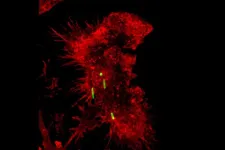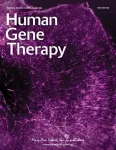(Press-News.org) Scientists have created a new test for identifying people at risk of developing acute myeloid leukaemia and related cancers, years before they do. The new platform, ‘MN-predict’, will allow doctors and scientists to identify those at risk and to design new treatments to prevent them from developing these potentially lethal cancers.
Researchers at the Wellcome-MRC Cambridge Stem Cell Institute (CSCI), the University of Cambridge’s Department of Haematology, and Instituto de Investigación Sanitaria del Principado de Asturias (ISPA) analysed data from more than 400,000 individuals participating in the United Kingdom Biobank.
Using this data, the scientists have created "MN- predict", a platform for predicting the risk of developing blood cancers such as acute myeloid leukaemia, myelodysplastic syndromes and myeloproliferative neoplasms over a 10-15-year period. This test, now available in NHS clinics, requires patients to provide a blood sample from which DNA is extracted for limited sequencing, alongside basic blood cell counts. With this information, MN-predict identifies those at high risk of any of these cancers and can be used in specialist clinics for leukaemia prevention.
Professor George Vassiliou, senior author of the study said “We all know that prevention is better than cure, but it is not easy to prevent diseases like leukaemia without knowing who is at risk. MN-predict makes it possible to identify at-risk individuals, and we hope it can become an essential part of future leukaemia prevention programmes.”
The myeloid neoplasms are a group of related cancers encompassing acute myeloid leukaemia, myelodysplastic syndromes and myeloproliferative neoplasms. Treatments for these cancers have improved in the last few years, but most cases remain incurable.
In the last few years, scientists discovered that these cancers develop over decades through the accumulation of DNA mutations in blood stem cells, the cells responsible for normal blood formation. These mutations encourage these stem cells to grow faster than normal and, as more mutations accumulate, they can progress towards leukaemia. Thankfully, whilst mutations that promote cell growth are common, leukaemia develops only in a small minority of cases. Identifying these cases early on helps efforts to prevent the cancers from developing.
Dr Muxin Gu, first author of the paper, said “We hope that MN-predict will help clinicians to identify people at risk of myeloid cancers and use novel treatment to prevent the cancers from developing”.
Dr Pedro M. Quiros, joint senior author of the study, said “Despite some recent advances in their treatment, these cancers remain lethal to many sufferers. We hope that our efforts will help advance prevention in favour of treating the full-blown disease”.
The research and development of MN-Predict was funded by Cancer Research UK and the Leukaemia and Lymphoma Society. Scientists from the Early Cancer Institute, University of Cambridge, University of Bristol, University of Oviedo (Spain), University of York, AstraZeneca (UK), German Cancer Research Center (DKFZ, Germany), St. James's Hospital, Leeds and University of Pavia (Italy) also participated in the study.
END
Cambridge and ISPA scientists create a tool to identify individuals at risk of developing different myeloid leukemias
2023-08-24
ELSE PRESS RELEASES FROM THIS DATE:
Repairing broken brain circuits may offer path to new Parkinson’s treatments
2023-08-24
GRAND RAPIDS, Mich. (August 24, 2023) — Van Andel Institute scientists have identified a series of processes that help the brain adapt to damage caused by breakdowns in circuits that govern movement, cognition and sensory perception.
Because such breakdowns contribute to Parkinson’s disease, the findings may one day help researchers optimize current treatments or develop new ones that repair or bypass the broken circuits.
A study describing the findings published this week in the journal Science Advances.
“Our work highlights the importance ...
MSK Research Highlights, August 24, 2023
2023-08-24
New research from Memorial Sloan Kettering Cancer Center (MSK) and the Sloan Kettering Institute — a hub for basic science and translational research within MSK — suggests a method for revealing DNA repair “scars” could help make treatment decisions in BRCA1- and BRCA2-deficient cancers; modified a bacteria-made compound to target mutant KRAS-driven cancers; and shed new light on brain metastasis in non-small cell lung cancer.
New method for revealing DNA repair “scars” ...
Study uncovers genetic risk factors for heart failure
2023-08-24
In a new study co-led by investigators at the United States Department of Veterans Affairs and Brigham and Women’s Hospital, a founding member of the Mass General Brigham healthcare system, a global team of scientists conducted one of the largest genetic association studies on heart failure to date. Using genomic data from over 90,000 heart failure patients and more than a million controls, the team identified 39 genetic mutations associated with heart failure, 18 of which had not been reported previously.
The researchers also pinpointed seven druggable proteins that, when targeted with specially ...
Training immune cells to remove ‘trash’ helps resolve lung inflammation
2023-08-24
Inflammation is a standard part of our bodies’ immune system response. But sometimes this response becomes hyperactivated in our lungs, causing inflammation to continue unchecked, which can be fatal. Many deaths from COVID-19 have been due to excessive inflammation, which results in acute lung injury.
A group of researchers at the University of Illinois Chicago have investigated how lungs counterbalance inflammation. Their work points to cells in the lung that reduce inflammation by removing ...
A new pathway to regenerate myelin discovered
2023-08-24
A study led by Dr. Hyun Kyoung Lee, associate professor at Baylor College of Medicine and investigator at the Jan and Dan Duncan Neurological Research Institute at Texas Children’s Hospital, has discovered a new biological mechanism to regenerate and repair myelin, a protective sheath that insulates neuronal fibers and plays a vital role in ensuring rapid and accurate neurotransmission. The Duncan NRI team found novel roles for the Dishevelled associated activator of morphogenesis 2 (Daam2) protein and CK2α kinase in regulating myelin repair and regeneration. The study was published in the Proceedings of the National ...
Monell Center helps discover epigenetic mechanism that causes bitter taste distortion
2023-08-24
PHILADELPHIA (August 24, 2023) – A bitter taste in the mouth is often a symptom or side effect of illness, which may be the result of how the body reacts to pathogens. A new study published in iScience, by Hong Wang, PhD, an Associate Member at the Monell Chemical Sense Center, and colleagues sheds light on the mechanisms involved in the complex interplay between taste perception and immune function. Their work also highlights the potential of a sequencing tool for investigating epigenetic mechanisms that affect taste-cell gene expression. Epigenetics is the study of how and when genes are expressed rather than alteration of the genetic ...
Gene therapy targeting the brain vasculature
2023-08-24
Researchers have developed an engineered adeno-associated virus (AAV) vector that yields high transduction of brain vascular pericytes and smooth muscle cells. The study describing the characterization of this novel AAV capsid is published in the peer-reviewed journal Human Gene Therapy. Click here to read the article now.
In the current study, Servio Ramirez, from Temple University School of Medicine, Patricia Musolino, from Massachusetts General Hospital, and Casey Maguire, from Harvard Medical School, and coauthors, characterize AAV-PR, the capsid that demonstrated high transduction of the brain vasculature. AAV-PR offers the ...
Overlooked part of brain could play critical role in addiction recovery
2023-08-24
INDIANAPOLIS—Researchers from Indiana University School of Medicine have discovered a neglected brain region that could play a critical role in how likely a person with drug use disorders is to relapse, even after a long withdrawal period. Their findings were published recently in Biological Psychiatry.
“Past studies in the field of addiction research have focused on the medial prefrontal cortex, which is the part of the brain that controls decision making, but no effective prevention or treatment for drug relapse is available,” said Yao-Ying Ma, MD, PhD, associate professor of pharmacology ...
Metabolite in urine predicts diabetic kidney failure 5-10 years early; oral therapeutic drug shows promise in mice
2023-08-24
SAN ANTONIO (Aug. 24, 2023) — Urine levels of adenine, a metabolite produced in the kidney, are predictive and a causative biomarker of looming progressive kidney failure in patients with diabetes, a finding that could lead to earlier diagnosis and intervention, researchers from The University of Texas Health Science Center at San Antonio (also called UT Health San Antonio) reported Aug. 24 in the Journal of Clinical Investigation.
Elevated adenine was also associated with all-cause mortality.
The study results are significant because until now, the most important ...
Math enables blending hydrogen in natural gas pipelines
2023-08-24
LOS ALAMOS, N.M., Aug. 23, 2023 — Mathematical modeling can show how to safely blend hydrogen with natural gas for transport in existing pipeline systems. A secure and reliable transition to hydrogen is one of the proposed solutions for the shift to a net-zero-carbon economy.
“Mixing hydrogen into a natural gas pipeline changes how the gases flow, which will create new conditions for operators,” said Anatoly Zlotnik, a co-author of a new paper on the modeling in the journal PRX Energy. ...


